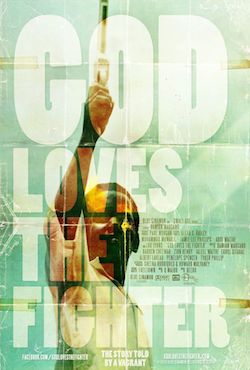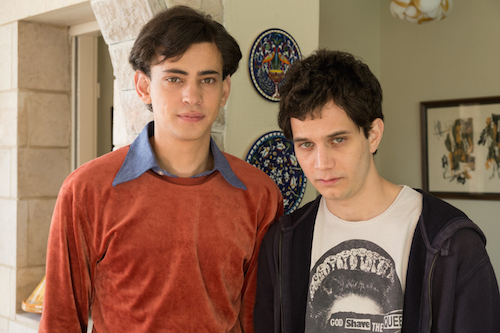- 9 years ago
-
 Damian Marcano’s debut feature, God Loves the Fighter, is a raw, highly stylized film about life in the rough Laventille neighborhood of Trinidad and Tobago’s capital, Port of Spain. Replete with a cast of colorful characters (played by an all-Trinidadian cast), eye-popping visuals, and a strong soundtrack of music by Q Major and Freetown Collective, God Loves the Fighter is a loose, impressionistic film that makes up in grit and atmosphere what it lacks in cohesion. It’s also a rare depiction of the struggling inhabitants of a city that has one of the highest crime rates in the Caribbean.
Damian Marcano’s debut feature, God Loves the Fighter, is a raw, highly stylized film about life in the rough Laventille neighborhood of Trinidad and Tobago’s capital, Port of Spain. Replete with a cast of colorful characters (played by an all-Trinidadian cast), eye-popping visuals, and a strong soundtrack of music by Q Major and Freetown Collective, God Loves the Fighter is a loose, impressionistic film that makes up in grit and atmosphere what it lacks in cohesion. It’s also a rare depiction of the struggling inhabitants of a city that has one of the highest crime rates in the Caribbean.The film is largely narrated by King Curtis (Lou Lyons, half of reggae/spoken word duo Freetown Collective), a charismatic street poet and vagrant who describes Port of Spain’s poor east side as “a dirty, nasty concrete jungle of fallen leaves.” Curtis introduces us to a variety of characters, filling us in on their often-bleak back stories. These include main protagonist Charlie (Muhammad Muwakil, Freetown Collective’s other half), who is trying to find legitimate work; Dinah (Jamie Lee Phillips), a young prostitute who finds solace in a local church; Moses (Simon Junior John), a middle-aged taxi driver who runs drugs in order to make ends meet; and Putao Singh (Darren Cheewah), a sinister thug who spouts bad ethnic jokes as he commandeers a combination bar/brothel/cocaine ring that controls just about everyone in the film. These characters (there’s also a young boy and his grieving, abusive mother; Charlie’s childhood friend-turned-gangster; and an older father figure) are initially hard to keep track of, but their lives ultimately intersect to some degree. Dialogue is naturalistic and seemingly improvised at times, some of it in patois (there are subtitles throughout).
The film has several running motifs, including recurring radio news reports of the city’s latest murders and frequent dialogue about obtaining food (many of the characters are chronically hungry). Several scenes feature a priest in the church where Dinah takes refuge, preaching welcome and forgiveness to all sinners. The movie takes its time building to the point where a desperate Dinah enlists Charlie help her escape Singh’s harem, giving him an opportunity to break away from his own dangerous job accompanying Moses on drug runs. A drawn-out climax involves the deaths of several characters, followed by the inevitable and impersonal news headlines about the city’s latest murders. Though disjointed and chaotic at times, God Loves the Fighter still manages to pack a significant punch.
God Loves the Fighter is available on iTunes and Amazon, and on DVD at godlovesthefighter.com.
 Also out this week is Meet Me in Montenegro, starring, directed and written by Alex Holdridge and Linnea Saasen. The film, which is based on the duo’s actual experiences, is a talky, low-key romantic comedy that is sometimes reminiscent of Richard Linklater’s Before Sunrise trilogy, but is very much its own thing; charming in spite of its excesses and romcom conventions.
Also out this week is Meet Me in Montenegro, starring, directed and written by Alex Holdridge and Linnea Saasen. The film, which is based on the duo’s actual experiences, is a talky, low-key romantic comedy that is sometimes reminiscent of Richard Linklater’s Before Sunrise trilogy, but is very much its own thing; charming in spite of its excesses and romcom conventions.When frustrated, broke LA filmmaker Anderson (Holdridge) goes to Berlin for a meeting he hopes will bring his latest project to fruition, he runs into Lina (Saasen), a dancer he met the last time he was in town. Back then they had a short intense affair involving a spontaneous trip to the Balkans (ending up in Montenegro), before she abruptly fled without explanation. Though Anderson is reluctant to get involved – and possibly hurt — again (he’s a sensitive type who cries watching The Bachelor) they’re inevitably drawn to each other. Their time is limited, as she’s leaving in a couple of days for a residency in Budapest.
There are several twists and turns on both the romantic and professional fronts, causing Anderson to experience rollercoaster emotions as he tries to keep his film alive and be true to himself — and to Lina; he finally learns why she bailed on their previous relationship. Interwoven throughout their story are scenes of another romantic involvement, that of Anderson’s friend Stephen (Rupert Friend) and the latter’s longtime girlfriend Friederike (Jennifer Ulrich). The couple, with whom Anderson is staying in Berlin, initially seem nonchalant about exploring their sexual horizons, but their relationship is clearly having its own issues, culminating in uneasy scenes set at a sex club.
Though the film’s dialogue is sometimes clunky and mundane, it often rings true, especially in a scene where Anderson, enraged after a setback in the making of his film, lashes out at Lina who is trying to comfort him with platitudes. And though the ending is somewhat predictable, it’s saved by self-aware dialogue and the amusing fact that the couple’s story is the subject of both Anderson’s next film and the film we’re watching. It’s all very meta.
Meet Me in Montenegro is in theaters, on iTunes and on demand this Friday, July 10.
—Marina Zogbi
Latest News
- 9 years ago
-
No doubt about it, fashion and music have an almost symbiotic connection. Tastemakers like Gwen Stefani make it look so easy, right? However, with the hit-and-misses of musical fashion designers like Kayne West, finding a way to successfully meld the two together is not an easy feat.
That’s what makes former fashion accessories designer Krista Retto such a fascinating subject. She’s flawlessly applied her talents in marketing and advertising into successful jewelry-making career, and then reinvented herself again (of course using all the skills she’s mastered) to create a music company.

She’s the co-founder of the Big House Companies, comprised of a music publishing house (Big House Publishing) and a indie record label (BHi Music Group), that has found a way to harness all of her past experiences into one all-encompassing career.
Ready to reinvent yourself? Krista gives some insight into how it’s done. Read and learn after the jump. BhpNewYork.com
Jacqueline Colette Prosper, yummicoco.com
- 9 years ago
-
New Jersey’s pop punkers Man Overboard released their newest album Heavy Love today. The record is the follow-up to their 2013 release Heart Attack. The band has been steadily putting out music since their founding in 2008, beginning with the self-released Hung Up on Nothing. Not long after their EP came out, the band signed to Run for Cover Records and released another EP Dahlia. The following year, the band released Real Talk and signed to Rise Records. While the group has cycled through a few drummers and shifted its formation to some extent during this process, they’ve also largely stayed the same. Band members and childhood friends Nik Bruzzese (vocals, bass) and Wayne Wildrick (guitar) formed the group, recruiting Zac Eisenstein (guitar, vocals, piano) and then-drummer Justin Mondschein to join soon after. There was some reshuffling of the line-up in those early years and a period where Wildrik briefly left Man Overboard, but band’s current iteration seems to be sticking. The newer members guitarist Justin Collier and drummer Joe Talarico fit seamlessly into the band’s sound, creating no disruption for this new record, which in it’s nature is full-blown pop punk.
You can hear the famed inflection in Heavy Love’s opening track “Now That You’re Home”. Bruzzese nails that almost nasal-y tone without sounding whiny and lets listeners know within the first three minutes of the record that Man Overboard is committed to the genre. As if naming their group after a Blink-182 song wasn’t enough, Man Overboard adds power-chord heavy guitar parts and call-and-response vocals to the equation. This results in the band sounding like they undoubtedly grew up listening to the founding fathers of the genre. However, no matter how committed their approach or how prolific they’ve been, the band fails to grab our attention in as memorable a fashion as Blink or New Found Glory did. The band may have earned themselves a spot on Warped, but they’re still not quite there.
Lyrically, some of Man Overboard’s new songs show real potential. One of the more infectious tracks off of Heavy Love, “Reality Check”, is a fast-paced true to form pop punk song. It’s the kind of track that you crank up and shout along to while driving. Eisenstein and Bruzzese share the mic with brilliant timing and you find yourself starting the song over for a second listen before it’s even over. “Anything” is another good one. It’s simple, short and gets to the desperate, lovesick point. There’s a Starting Line-esque feel to the quick lines and easy rhymes. That same care-bear, easy rhyme scheme comes off clumsy in other songs, but succeeds here.
The same can’t be said for “Cliffhanger”, which bats back and forth between being unimaginative and almost poignant. The vocals pair up perfectly for lines like, “Praying for the strength to try, wiping tears out of my eyes. / Watching chances pass me by as romance behind it dies,” but despite the Hoppus-DeLonge-like delivery, the sentiment of the words lands flat. It’s too heavy, even for a genre that often taps into your inner angry teenager. The song springs back to life in the very next line with a more notable lyric (“I realized I’m a natural second best and whatever is against me I’ll appear as something less”), but too much of the energy has already been lost and there isn’t much of a song to salvage. The majority of Heavy Love is that same kind of borderline ok. The record has its catchy moments and stronger songs, but it’s an album you stream a couple times, not one you buy. The album’s problem is how ordinary it is. Trying to sound original, yet old-school amidst the pop punk/emo revival is a hard balance to strike, so it’s an understandable conundrum. However, other bands have had more success on the same road. Man Overboard’s labelmates Knuckle Puck have a similar sound and their recent single “Disdain” hits the mark that Heavy Love missed.
Perhaps it’s a timing thing. The band has been busy in the best way, so perhaps they lack the luxury of taking a couple months or a year to craft an album. Man Overboard is known for being relatively quick about releasing new music, which is an achievement, but perhaps they need to stop hammering out new EPs and spend sometime really devoting themselves to a dozen or so tracks. One unexpected thing about Heavy Love is it doesn’t turn listeners off of the band, but rather it leaves them wondering what the band will do next. Maybe practice makes perfect and they’ll get us next time?
-Zoe Marquedant
- 9 years ago
-

Courtesy of Strand Releasing
Eran Riklis’s A Borrowed Identity starts out on a humorous note, as we see young Eyad (Razi Gabareen) attempting to improve his family’s TV reception by adjusting the roof antenna, while his father Salah (Ali Suliman) shouts instructions out the window. Though Eyad loses his footing, falls and is knocked unconscious, the generally blasé reaction of his family lets us know he’ll be OK. We learn that Eyad and his family – Salah, mother (Laëtitia Eïdo), grandmother (Marlene Bajali) and several brothers – are Arabs living in the Israeli town of Tira. Although the film, which is set in the 1980s and early 90s, retains moments of levity throughout, it soon becomes a serious coming-of-age story about a young man who is caught between two often clashing cultures.
According to a 2013 census, over 20% of Israel’s population are Arabs, citizens of Israel who consider themselves Palestinian by nationality. A Borrowed Identity is based on the semi-autobiographical novel Dancing Arabs by Sayed Kashua, who also wrote the screenplay. It’s a clear-eyed look at the difficult situation of people who are not full members of the society in which they live, as well as the well-intentioned attempts by those in power at bridging that gap. In one early, mordantly funny scene, young Eyad casually announces, “Mom, I brought home my Jew,” the result of a school program endeavoring to bring together Palestinian and Jewish children.
We learn that Eyad’s father attended university as a youth, but his pro-Palestine activities once led to arrest and imprisonment, after which he could only find menial work. (When the children in Eyad’s class are asked what their fathers do for a living, the boy refuses to admit that Salah is a fruit picker, insisting repeatedly that he is a “terrorist,” to the growing rage of his teacher.) Thus Salah is tremendously excited when the extremely bright Eyad (played as a teen by the soulful Tawfeek Barhom) is accepted into a prestigious Israeli boarding school, where he is the only Arab student. Predictably, things don’t go that smoothly for him – he’s bullied by some toughs and is generally ridiculed, particularly for his accent. (The “p” sound doesn’t exist in Arabic; at one point Eyad refers to the band “Deeb Burble.”) He also falls in love with Naomi (Danielle Kitzis), an attractive Jewish schoolmate whose feelings are reciprocal, and becomes close with Yonatan (Michael Moshonov), a darkly funny, alt-rock loving kid with muscular dystrophy, as well as the latter’s mother (Yaël Abecassis). “Sometimes I forget you’re an Arab,” Yonatan remarks at one point. “Me too,” replies Eyad. “Don’t worry,” says his pal. “Someone will always remind you.”

Courtesy of Strand Releasing
As the Gulf War rages mostly in the background – we see TV news reports and there are gas mask drills – Eyad is reminded of his status when soldiers conduct humiliating ID checks. During a visit home, as his family roots for Saddam Hussein’s SCUD-missile attack on Israel, Eyad calls Naomi to make sure she’s OK. Thus his mother discovers (and quietly supports) the relationship, though the couple initially keep it hidden at school and from her parents. In school Eyad speaks up in a literature class, pointedly questioning the negative symbolism of Arab characters in Israeli literature, winning him respect among some of his classmates. As his Hebrew accent improves (thanks to Naomi’s help) and he becomes somewhat more comfortable in his surroundings, Eyad remains conflicted; his is an uneasy, fractured existence.
Riklis has explored Israeli-Palestinian and Arab-Jewish relations before in his films (Lemon Tree, The Syrian Bride, Zaytoun), always highlighting the personal, human side of the conflict through the everyday interactions of people who are deeply affected by it, though they may not be political-minded themselves (i.e., the majority of humanity). Though the film’s surprise resolution is not completely convincing, A Borrowed Identity is a compelling depiction of a complicated, seemingly irresolvable situation and of people who are trying to make the best of their lives, as well as the lives of others. We should be grateful to Riklis for reminding us that these people exist.
A Borrowed Identity opens this Friday at Lincoln Plaza Cinema.
—Marina Zogbi
- 9 years ago
-
Haven: Saturday, July 25th at The Mothership, Brooklyn- 7pm – 1am
It’s summer and it’s time to celebrate with great music and art! AFP is co-hosting this rooftop soiree with our good pals over at NOoSPHERE Arts.
Barry Komitor’s (AFP’s Art Education Manager) band Bad Faces is set to perform with solo music performances from Lesley Kernochan and Charles Davi. Also, AFP’s Executive Director Frank Jackson (aka DJ Gatto) is breaking out some select choices from his vast vinyl collection, and longtime friend DJ/Producer SR SERGE will be spinning a late set for your dancing pleasure. To add to the flavor, we have AFP artists Daniel Maldonado (Gashouse Films) and Jeanne Wilkinson creating video installations, while Cat Del Buono will present her “Beauty Box” installation. Last but not least, the very talented performance artist Duckie L’Orange will intrigue us with her creativity. Check out the invite below, grab a six pack or a bottle of wine and let’s celebrate!!


